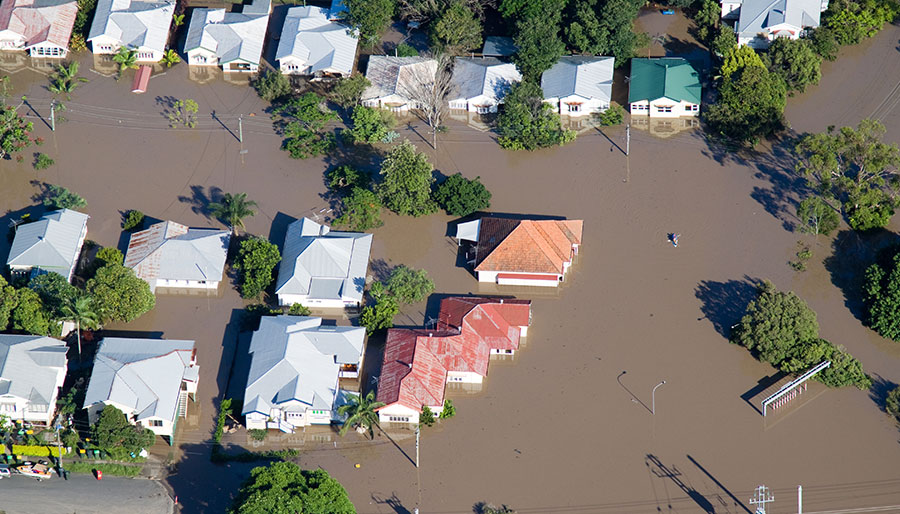We’ve all seen the recent flooding that has caused widespread damage throughout New South Wales and Queensland. Unfortunately, many people assume that their insurer will cover them for damage caused by floods and storms, but in some cases, insurers will decline those claims. Before you ask if we have insurance claim lawyers to help (we do!) – there are steps you should take first to protect yourself from loss and damage caused by natural disasters.
1. Read your policy carefully
Most people do not check their policy when they take out insurance and only discover that they are not covered, much to their surprise, when they need to make a claim.
It is essential that you locate your policy and check it carefully to ensure that your insurance covers you for natural disasters such as flooding. You also need to understand what additional cover you may have, such as the cost of temporary housing whilst you cannot live in your home.
If you can’t find your policy, call your insurer and ask for a copy of it.
2. Make sure your cover is right for you
If your policy does not cover you for flooding, contact your insurer and ask to be upgraded to a policy that does cover you. Unfortunately, some insurers do not provide cover for flooding in areas that have a history of flood damage, so it is essential to find out if your insurer is one of them.
If your insurer doesn’t cover your area because it is prone to flooding, find an insurer who does and transfer your cover to that insurer. You can get help from an insurance broker, although it is important to remember that most brokers are paid by insurance companies, so it pays to shop around to ensure you are getting the best insurance cover that’s right for you.
3. What should you do if you do suffer damage?
The first thing to do is to formally notify your insurer of your claim. This should be done as soon as possible. Your insurer will provide you with a claim number for future reference.
It is important to document the damage caused to your home and possessions. The best way to do this is with photographs. You want to ensure that you have sufficient evidence to justify the claims that you make.
Where possible, collate receipts relating to the cost of the items that have been destroyed or for work done to your property such as renovations and upgrades. You can never have too much information in support of your claim, especially where some insurers might seek to avoid paying out the fair value of a claim due to a lack of supporting evidence.
If documents have been damaged or lost due to the water damage, review your bank statements and credit card statements as they can be evidence of purchases or money spent on items you are seeking to claim for.
4. Make sure your claim includes all damage and loss
It is important that you do not make your claim too hastily. Make sure that your property is fully assessed and that all damage is included in your claim. Insurers may deny a further claim for damage that you had not discovered or did not include in your original claim, if they have already paid out an insurance claim arising from a flood event.
Do not guess as to the cost of replacing items or repairing damage. Gather proper evidence especially in relation to building rectification works that are required. Many people underestimate the cost of repairing a damaged building and this has been exacerbated by large rises in the cost of construction caused by the Covid pandemic.
It is therefore important to get quotes from qualified tradespersons for the true cost of repairing the damage before submitting your claim to the insurer.
5. Resolving your claim
Once the insurer has received your claim, the insurer will send out its own assessor to assess the damage and determine what it says the cost of the repairs will be. Often, the insurer’s assessor will recommend an amount that is below the value of your claim.
If you are unhappy with the offer made by your insurer, don’t accept it! you are entitled to negotiate the offer, and where the insurer continues to make offers which you are unhappy with, contact us and we can help resolve your claim for you for an amount which properly compensates you for the loss you have suffered.
Remember, the insurer is a business and its aim is to maximise its profits. Therefore, the insurer aims to pay out the least amount possible on each claim.
The insurer might also ask you to sign a release or settlement deed before paying your claim. It is essential that you DO NOT sign that document until you have obtained proper legal advice. These documents can be hard to understand and their terms can often have hidden meanings which affect your right to claim in the future.
Lawpoint’s team of highly experienced litigation lawyers have extensive experience negotiating with insurers. We’ll fight to make sure you get the best possible result from your insurance claim. Contact us today on (02) 9517 1887 or email [email protected].



